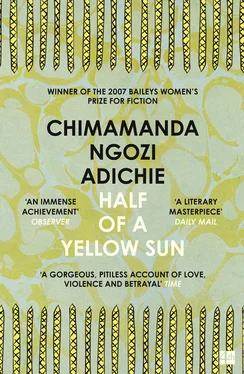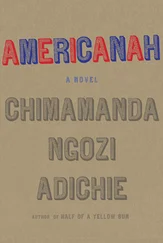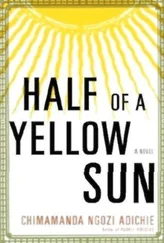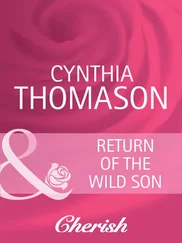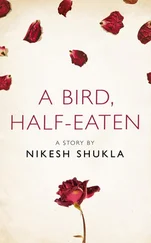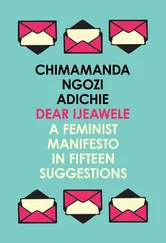‘I’m so sorry,’ he said.
She lit a cigarette, watching him. ‘Would you like to come to dinner tonight? My parents have invited a few people.’
For a moment, he was taken aback. Then he said, ‘Yes, I’d love to.’ He hoped the invitation meant something, reflected a change in her perception of the relationship. But when he arrived at her parents’ house in Ikoyi, she introduced him by saying, ‘This is Richard Churchill,’ and then stopped with a pause that felt like a deliberate dare to her parents and the other guests to think what they would. Her father looked him over and asked what he did.
‘I’m a writer,’ he said.
‘A writer? I see,’ Chief Ozobia said.
Richard wished he hadn’t said he was a writer and so he added, as if to make up for saying he was a writer, ‘I’m fascinated by the discoveries at Igbo-Ukwu. The bronze castings.’
‘Hmm,’ Chief Ozobia murmured. ‘Do you have any family doing business in Nigeria?’
‘No, I’m afraid not.’
Chief Ozobia smiled and looked away. He didn’t say very much else to Richard for the rest of the evening. Neither did Mrs Ozobia, who followed her husband around, her manner regal, her beauty more intimidating close up. Olanna was different. Her smile was guarded when Kainene introduced them, but as they talked, she became warmer and he wondered if the flicker in her eyes was pity, if she could tell how keen he was to say the right things and yet didn’t know what those right things were. Her warmth flattered him.
He felt strangely bereft when she sat far from him at the table. The salad had just been served when she began to discuss politics with a guest. Richard knew it was about the need for Nigeria to become a republic and stop claiming Queen Elizabeth as head of state, but he did not pay close attention until she turned to him and asked, ‘Don’t you agree, Richard?’ as if his opinion mattered.
He cleared his throat. ‘Oh, absolutely,’ he said, even though he wasn’t sure what it was he was agreeing with. He felt grateful that she had pulled him into the conversation, included him, and he was charmed by that quality of hers that seemed both sophisticated and naive, an idealism that refused to be suffocated by gritty reality. Her skin glowed. Her cheekbones rose as she smiled. But she lacked Kainene’s melancholy mystique, which exhilarated and confused him. Kainene sat next to him and said little throughout dinner, once sharply asking a steward to change a glass that looked cloudy, once leaning over to ask, ‘The sauce is nauseating, isn’t it?’ She was mostly inscrutable, watching, drinking, smoking. He ached to know what she was thinking. He felt a similar physical pain when he desired her, and he would dream about being inside her, thrusting as deep as he could, to try and discover something that he knew he never would. It was like drinking glass after glass of water and still emerging thirsty, and with the stirring fear that he would never quench the thirst.
Richard worried about Susan. He would watch her, the firm chin and green eyes, and tell himself that it was unfair to deceive her, to skulk in the study until she fell asleep, to lie to her about being at the library or museum or polo club. She deserved better. But there was a reassuring stability to being with her, a certain safety in her whispering and her study room with the pencil sketches of Shakespeare on the walls. Kainene was different. He left Kainene full of a giddy happiness and an equally dizzying sense of insecurity. He wanted to ask her what she thought of the things they never discussed – their relationship, a future, Susan – but his uncertainties muted him each time; he was afraid of what her answers would be.
He pushed any decisions away until the morning he woke up and thought about that day in Wentnor, when he was out playing and heard Molly calling him. ‘Richard! Supper!’ Instead of answering ‘Coming!’ and running to her, he dodged under a hedge, scraping his knees. ‘Richard! Richard!’ Molly sounded frantic this time, but he remained silent, crouched. ‘Richard! Where are you, Dicky?’ A rabbit stopped and watched him, and he locked eyes with the rabbit and, for those short moments, only he and the rabbit knew where he was. Then the rabbit leapt out and Molly peered under the bushes and saw him. She smacked him. She told him to stay in his room for the rest of the day. She said she was very upset and would tell Mr and Mrs Churchill. But those short moments had made it all worthwhile, those moments of pure plenary abandon, when he felt as if he, and he alone, were in control of the universe of his childhood. Recalling them, he decided he would end it with Susan. His relationship with Kainene might well not last long, but the moments of being with her, knowing he was not weighed down by lies and pretense, would make the brevity worthwhile.
His resolve buoyed him. Still, he put off telling Susan for another week, until the evening they returned from a party where she had drunk too many glasses of wine.
‘Would you like a nightcap, darling?’ she asked.
‘Susan, I care very much about you,’ he said in a rush. ‘But I’m not quite sure that things are going very well – that is, things between us.’
‘What are you saying?’ Susan asked, although her hushed tone and blenched face told him that she knew very well what he was saying.
He ran his hand through his hair.
‘Who is it?’ Susan asked.
‘It’s not another woman. I just think our needs are different.’ He hoped he did not sound insincere, but it was true; they had always wanted different things, always valued different things. He should never have moved in with her.
‘It’s not Clovis Bancroft, is it?’ Her ears were red. They always turned red after she drank, but he was only noticing the strangeness of it now, the angry-red ears jutting out by her pale face.
‘No, of course not.’
Susan poured herself a drink and sat on the arm of the sofa. They were silent for a while. ‘I fancied you the minute I saw you and I didn’t think I would, really. I thought how handsome and gentle he is, and I must have resolved there that I would never let you go.’ She laughed quietly, and he noticed the tiny lines around her eyes.
‘Susan –’ he said, and stopped, because there was nothing else to say. He hadn’t known she thought these things of him. He realized how little they had talked, how their relationship had been like an artless flow with little input from them, or at least from him. The relationship had happened to him.
‘It was all too rushed for you, wasn’t it?’ Susan said. She came and stood by him. She had regained her composure; her chin no longer quivered. ‘You didn’t get a chance to explore, really, to see more of the country like you wanted to; you moved in here and I’ve made you go to these ghastly parties with people who don’t much care about writing and African art and that sort of thing. It must have been so awful for you. I’m terribly sorry, Richard, and I do understand. Of course, you must see a bit of the country. Can I help? I have friends in Enugu and Kaduna.’
Richard took the glass from her, put it down, and took her in his arms. He felt a faint nostalgia at the familiar apple scent of her shampoo. ‘No, I’ll be all right,’ he said.
She didn’t think it was really over, it was clear; she thought he would come back and he said nothing to make her think differently. When the steward in the white apron opened the front door to let him out, Richard was light with relief.
‘Bye, sah,’ the steward said.
‘Goodbye, Okon.’ Richard wondered if the inscrutable Okon ever pressed his ear to the door when he and Susan had their glass-breaking rows. He once asked Okon to teach him some simple sentences in Efik, but Susan had stopped it after she found them both in the study, Okon fidgeting as Richard pronounced the words. Okon had looked at Susan with gratitude, as if she had just saved him from a mad white man, and later, Susan’s tone was mild when she said she understood that Richard didn’t know how things were done. One couldn’t cross certain lines. It was a tone that reminded him of Aunt Elizabeth, of views endorsed with an unapologetic, self-indulgent English decency. Perhaps if he had told Susan about Kainene, she would have used that tone to tell him that she quite understood his need to experiment with a black woman.
Читать дальше
